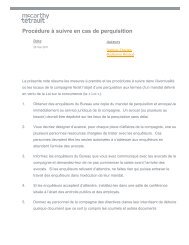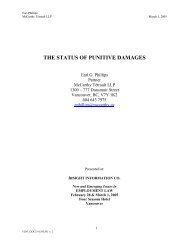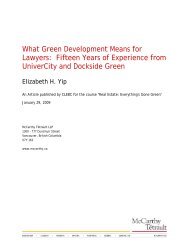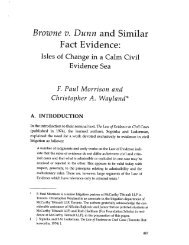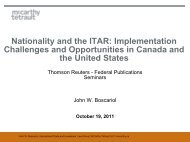The Doctrine of Public Policy in Canadian Contract Law
The Doctrine of Public Policy in Canadian Contract Law
The Doctrine of Public Policy in Canadian Contract Law
You also want an ePaper? Increase the reach of your titles
YUMPU automatically turns print PDFs into web optimized ePapers that Google loves.
18 / Annual Review <strong>of</strong> Civil Litigation<br />
2. <strong>Contract</strong>s Injurious to the State<br />
<strong>The</strong>re have traditionally been two heads <strong>of</strong> public policy <strong>in</strong>cluded with<strong>in</strong><br />
the category <strong>of</strong> contracts <strong>in</strong>jurious to the state: (1) contracts which are prejudicial<br />
to its foreign affairs; and (2) contracts which are prejudicial to its domestic<br />
affairs.<br />
<strong>The</strong> recognition that contracts <strong>in</strong>jurious (although not treasonous) to the<br />
foreign affairs <strong>of</strong> the state form a dist<strong>in</strong>ct head <strong>of</strong> public policy can be traced to<br />
1799, when it was held that contracts with the enemy dur<strong>in</strong>g a period <strong>of</strong> war<br />
were unenforceable." <strong>The</strong>re have s<strong>in</strong>ce been several English judgments" (and<br />
those where no pr<strong>in</strong>ciple has ever been distilled <strong>in</strong>to a common set <strong>of</strong> propositions (such<br />
as the rule aga<strong>in</strong>st gam<strong>in</strong>g contracts). Much as the l<strong>in</strong>e between "illegality" and public<br />
policy is not easy to draw, there is significant overlap between the traditional public policy<br />
categories. As noted by Chitty, supra note 6, at 940, "[c]erta<strong>in</strong> cases do not fit clearly <strong>in</strong>to<br />
any <strong>of</strong> these...categories." In this, as <strong>in</strong> virtually every area related to public policy,<br />
commentators are divided over how best to characterize the doctr<strong>in</strong>e. <strong>The</strong> authors <strong>of</strong><br />
Chitty, supra note 6, list five categories, while Fridman, supra note 5, lists six. Waddams<br />
seems to have n<strong>in</strong>e, although he never expresses an actual number. Curiously, although<br />
there exists substantial disagreement as to the proper classification <strong>of</strong> the heads <strong>of</strong> public<br />
policy, the commentators are <strong>in</strong> general harmony with respect to what is to be treated as<br />
a "head" (i.e., as an <strong>in</strong>stance <strong>of</strong> the application <strong>of</strong> the doctr<strong>in</strong>e <strong>of</strong> public policy itself). For<br />
the purposes <strong>of</strong> the present work, we have adopted the general organization <strong>of</strong> categories<br />
suggested by Fridman, absent his first category (which is concerned with "illegal" contracts)<br />
for reasons noted above. Given the scope <strong>of</strong> this paper, only the most cursory<br />
exegesis and analysis <strong>of</strong> the categories may be here undertaken, and the reader is urged<br />
to consult standard contract texts should he or she desire to ga<strong>in</strong> a more mature understand<strong>in</strong>g<br />
<strong>of</strong> the cases <strong>in</strong> which public policy has been applied by the courts. <strong>The</strong> exhaustive<br />
depiction <strong>of</strong> the categories undertaken by Buckley, supra note 8, extends to approximately<br />
one hundred and fifty pages. Indeed, the sheer breadth <strong>of</strong> the topic has led Waddams,<br />
supra note 4, at 397, to reject "[a] detailed account <strong>of</strong> each area <strong>of</strong> common law and<br />
statutory illegality [as] out <strong>of</strong> place <strong>in</strong> a general study <strong>of</strong> contract law. <strong>The</strong> law <strong>of</strong> restra<strong>in</strong>t<br />
<strong>of</strong> trade, for example, fills whole books."<br />
86 <strong>The</strong> Hoop (1799), 1 C. Rob. 196. This pr<strong>in</strong>ciple is <strong>of</strong> course tied to larger concerns relat<strong>in</strong>g<br />
to national security. For a decision which recognized that national security could justify<br />
a court <strong>in</strong> prohibit<strong>in</strong>g the disclosure <strong>of</strong> confidential <strong>in</strong>formation on public policy grounds,<br />
see <strong>The</strong> Lord Advocate v. <strong>The</strong> Scotsman <strong>Public</strong>ations Ltd.,[1989] 1 F.S.R. 310 (Ct. Sess.),<br />
affirmed [1990] I A.C. 812 (H.L.) at 319 [F.S.R.] . Another aspect <strong>of</strong> the rule which<br />
prohibits contracts <strong>in</strong>jurious to the foreign affairs <strong>of</strong> the state is the comity doctr<strong>in</strong>e that<br />
forbids the enforcement <strong>of</strong> contracts where this would result <strong>in</strong> an activity that breaches<br />
the law <strong>of</strong> a friendly foreign country (see: De Wutz v. Hendricks (1824), 2 B<strong>in</strong>g. 314;<br />
Ralli Brothers v. Companion Naviera Sota y Aznar,[1920] 2 K.B. 287 (Eng. K.B.); Foster<br />
v. Driscoll,[ 1929] 1 K.B. 470 (Eng. K.B.); Shiesel v. Kirsch, [1931] O.R. 41 (C.A.) ; and<br />
Re gazzoni v. K.C. Serhia, [1958] A.C. 301 (H.L.)), even if the contract is governed by<br />
domestic law (Lemenda Trad<strong>in</strong>g Co. Ltd. v. African Middle East Petroleum Co. Ltd.,<br />
[1988] Q.B. 448 (Q.B.D.)). However, this rule may not apply where the contract, while<br />
illegal under the laws <strong>of</strong> a foreign country, is legal both <strong>in</strong> the place where it is to be



